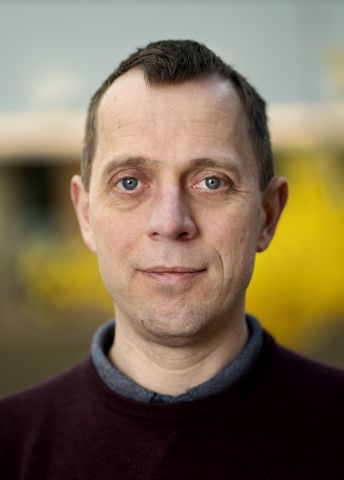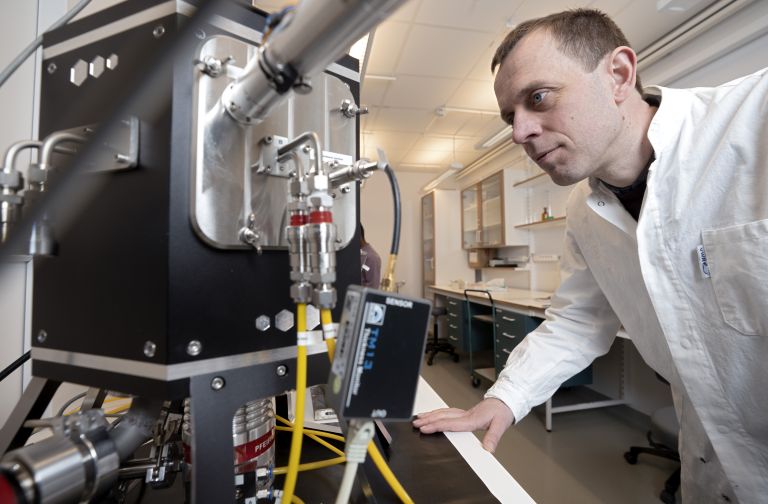
Karl Börjesson
Professor of Physical Chemistry
Wallenberg Academy Fellow, prolongation grant 2022
Institution:
University of Gothenburg
Research field:
Photophysical chemistry


Wallenberg Academy Fellow, prolongation grant 2022
Institution:
University of Gothenburg
Research field:
Photophysical chemistry
Essentially, it’s about shuffling energy – at enormous speed – within and between molecules. This enables the researchers to design molecules that perform exactly as they desire. That’s how Börjesson, who is a professor of physical chemistry at the University of Gothenburg, describes the research to which he has devoted much of his career. His Wallenberg Academy Fellow grant for this research has recently been extended.
“Our research team is focusing on building molecules and molecule-based systems with unique properties that we can utilize,” he says.
Börjesson conducts research at the intersection of chemistry and physics. One goal is to explore how molecules can interact to create materials of the future. Much of his work is based on photoactive organic molecules, i.e., molecules that interact with light in various ways. The researchers have managed to create very strong couplings between light and molecules, leading to fascinating phenomena.
“When this coupling becomes strong enough, the energy levels of the entire system change. The light and molecules combine to create a hybrid state possessing properties that are beyond the capabilities of either molecules or light alone – and that can be utilized in various ways. We’re conducting basic research, but our findings could pave the way for more efficient solar cells,” he says.
Over the next few years, Börjesson aims to build on the knowledge he has accumulated. Instead of coupling light and molecules, he intends to create the same type of strong coupling between two or more molecules.
Here too, it’s about shuffling and influencing energy levels to give molecules certain properties. His research team’s fundamental aim is to reduce energy losses that may occur – for instance when a molecule emits heat instead of the desired light.
“When electrical energy is imparted to a molecule, energy-rich molecular states are created. Only a quarter of these states are effective at emitting light. Much of the energy is lost – often as heat. By creating a strong coupling between different molecules, we can lower the energy level of the states effective at emitting light. This means energy can flow through these states, enabling much more energy to be emitted as light,” he says.
I hope my research can demonstrate that this technology offers the potential to drastically reduce the energy consumed by screens and lighting.
Successfully reducing energy losses and achieving much higher light output from molecules could help build better organic light-emitting diodes (OLEDs) – such as the ones in our TV screens.
“I hope my research can demonstrate that this technology offers the potential to drastically reduce the energy consumed by screens and lighting. Much of the electricity we produce goes on light, so there are myriad potential applications and enormous scope for energy savings,” he says.
Börjesson does not come from a family of researchers. In his youth, he had no thoughts of entering the world of research – let alone becoming a professor. But his interest in technology was always there, as was his desire to create and build new things, especially with LEGO and Meccano.
“I’ve always enjoyed solving technical problems. And I don’t need to find the answer immediately; I like letting things simmer in the back of my mind. In that way, I suppose I have a mindset well-suited to research,” he says.
His research career began by chance. Or rather, an unexpectedly exciting thesis topic during his university studies captured his interest in the field. He views being a researcher as a fantastic opportunity to pursue the ideas that excite him, and he is happy to have the freedom to do so. Funding from Knut and Alice Wallenberg Foundation gives a further boost to this freedom and his enthusiasm for research.
“The enduring support I’ve received means I don’t have to spend time writing lengthy grant applications. Instead, I can focus on research, mentoring my doctoral students, and developing my ideas. It means a great deal,” he says.
Text Ulrika Ernström
Translation Maxwell Arding
Photo Johan Wingborg